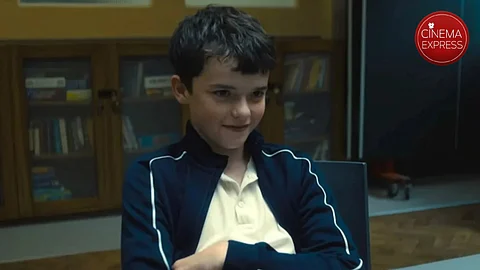

“Dad, it wasn’t me… I haven’t done anything wrong… I promise.”
“I could’ve touched any part of her body. I really wanted to, but I didn’t.”
Two different moments. But the same chilling certainty.
Watching Netflix’s Adolescence—a harrowing, unflinching take on teenage masculinity—these lines from 13-year-old Jamie Miller (Owen Cooper) strike hard. He’s been arrested for murdering his classmate Katie Leonard, and he says these words with a straight face, with conviction.
This isn’t just denial—it’s belief. The belief that he hasn’t crossed a line. A belief not born overnight, but slowly shaped, reinforced, and legitimised in the digital echo chambers around him.
What Adolescence Shows Us
Created by Jack Thorne and Stephen Graham (who also plays Jamie’s father, Eddie), Adolescence isn’t just a murder mystery. It’s a raw, disquieting look at how a vulnerable, self-loathing schoolboy can be radicalised—right under our noses. Shot entirely in single takes, the four-episode series drags us uncomfortably close to its characters and their breakdowns.
Jamie is timid when we first meet him. When police burst into his room at dawn, he wets his pants. He cries. His parents keep repeating, “He’s just a child.” But by Episode 3—arguably one of the most disturbing in television history—we see another side.
His social media reveals a troubling trail: aggressive comments under female influencers’ posts, casual misogyny, references to 'red pill theory' and 'incels'. During a therapy session, Jamie insists he doesn’t “buy into that incel stuff”—but his actions, and entitlement, tell a different story.
He confesses he asked Katie out because she seemed “weak.” When she rejected him—“Oh, I’m not that desperate”—his ego was wounded. That reaction is telling. There’s an expectation that female attention should be met with gratitude. When it isn’t, it becomes a perceived humiliation. The resentment festers.
In one unsettling moment, Jamie refuses to follow his psychologist’s instructions, asserting dominance: “You do not tell me to sit down.” When he senses her discomfort, he twists the knife: “Did I scare you when I shouted? I’m only 13. I don’t think I look that scary. How embarrassing is that? Getting scared of a 13-year-old.”
Adolescence doesn’t just shock us with the crime—it shows us how the boy got there.
The Real World Manosphere
What makes Jamie’s shift so terrifying is how recognisable it is. If you’re a teenage boy in 2025, your idea of masculinity is likely shaped more by Instagram, YouTube, and Reddit than by your family.
In India, where patriarchal values are already deeply rooted, the internet has become fertile ground for manosphere ideology. Online, you’ll find influencers—local and global—glorifying dominance, entitlement, and misogyny, often in the guise of 'life coaching' or 'self-improvement'.
Indian influencers like Elvish Yadav and Sarthak Goel draw from the Andrew Tate playbook: preaching control, bragging about alpha behaviour, and teaching boys “how to make girls obsessed with you” or “break their ego.” Gym culture, too, sometimes morphs into a warped performance of strength-as-superiority.
This culture isn’t restricted to the algorithm. It seeps into our screens. In films like Animal, hypermasculinity is not just present—it’s glorified. A man slaps his wife? A hero rounds his fist when his girlfriend leaves him? These aren’t just dramatic moments—they’re messages. And young boys, impressionable and online, are watching. And agreeing.
Even 'sweet' content—like a wife skipping meals for her husband while he remains indifferent—reinforces deeply rooted gender roles. The audience? Teenage boys. Young men. Boys like Jamie.
The Digital Conditioning of Boys
Open the comment section of any woman’s post, and you’ll see it:
- A woman calls out misogyny? "Feminist spotted. You just hate men."
- A woman posts about an alleged case of harassment? “Maybe if you dressed
properly, this wouldn’t happen.”
- A woman rejects a man’s advances online? “You’re not even that pretty,
don’t act like a queen. You will regret this.”
- A woman posts strongly about men? “This is the unfortunate effect of
educating women.”
These aren’t just harmless comebacks or 'trolls'. This is learned behaviour. Boys are being taught—subtly and not so subtly—that to be a man is to dominate, to be feared. That if women reject you, they deserve resentment. That feminism is the enemy.
And perhaps more dangerously, they’re being taught that they are the victims.
Watching Adolescence from India
Recent reports in India have featured teenage boys committing violent crimes—including the murder of classmates and siblings. Watching Adolescence in this context feels especially urgent.
Social media has redefined worth. Likes, followers, shares—they’re currency. And when young people, like Jamie, are deprived of that validation, it builds into something darker. They feel invisible. Powerless. Angry.
What’s frightening is that they don’t even see the shift in themselves.
“I could do anything, but I didn’t. Most boys would have. So that makes me better, don’t you think?”
This line really caught me wondering. It’s not just an admission— it’s a glimpse into a young boy’s fractured understanding of power, control, and entitlement. Jamie isn’t just a boy who made a mistake; he’s a boy shaped by a world that taught him to see violence, dominance, and resentment as natural responses. And he is far from the only one.
No Easy Answers
Adolescence doesn’t offer closure. There’s no comfort in its ending. Instead, it leaves us uneasy, asking:
What is it like to be a boy growing up today—with everything at your fingertips and so little guidance?
How did we let it get this far?
And what are we doing to stop it from going further?
These aren’t rhetorical questions. They’re warnings. And Adolescence dares us to listen.
(The writer is a journalist and public policy professional who writes primarily on gender issues.)